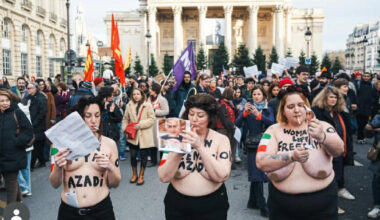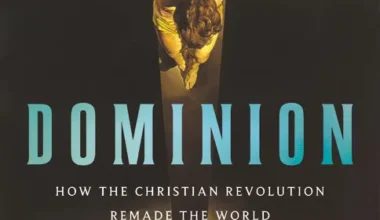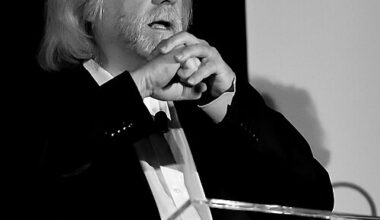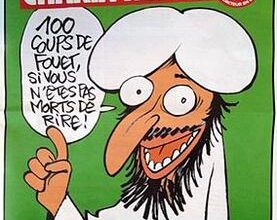This article was originally published in the Slovak print magazine MAč (for which it was translated into Slovak by Tomáš Hučko). It appears online for the first time here (with minimal editorial interference beyond minor formatting changes).
Exile is a strange combination of feelings, circumstances, and consequences, which simultaneously contain and express both an ending and a conclusion in a powerful way. These feelings, circumstances, and consequences, of course, revolve only around those who are fortunate or unfortunate enough to be exiled. By looking at the lives of other exiles throughout history, we see exile as a doorway to freedom and liberation—a door to escape the swords of one’s homeland and society, the suffocation of constant surveillance, censorship, and threat, and the anguish of trying to live one’s own life in untenable circumstances.
But at the same time, this escape traps the liberated writer or artist in an invisible prison of traumas, writer’s block, and separation from oneself. This freedom often includes deep disappointment and emotional wounds, creating an unstable and seemingly contradictory mental mixture that defines the exiled state and position. Exile is a state of conflict: it offers escape but imposes isolation; it opens new opportunities but erases old certainties.
This article attempts to examine exile not solely as a negative experience but as a multi-layered and paradoxical state. Drawing on readings, observations, and personal experiences, I argue that exile is a contradictory mixture of three powerful forces: freedom, disappointment, and trauma. That is, exile is not simply a physical removal from harm, i.e. a physical displacement, but a psychological instability in which freedom coexists with struggle, defeat, and despair. It often severs the exile’s connection to the original cause of their flight, pushing them into a life marked by trauma, isolation, and a sense of failure.
Freedom
An exile is different from other immigrants. While most immigrants have, for various reasons, planned their departure with an expectation of a new start, refugees and exiles had no such preparation: they are fleeing a dangerous situation with no plan. But refugees typically flee en masse, and their struggles are shared among them. Sometimes they join other refugee communities, or they are resettled as a larger group and find a network.
This is not the case for the exile. The exile is in many ways singular—cast out from the homeland’s security system and alone in trying to find a new path. There may be others who similarly go into exile, but the journey and experiences are singular. For some, there is no community of exiles to which they can find support, belonging, or network opportunities.
Nonetheless, in exile, they gain freedom from significant danger. Exile creates the possibility of political and intellectual liberation. Writers and activists who have fled violence, threats, oppressive regimes, and socio-religious taboos breathe a sigh of relief in exile. After immense anxiety and fear, they can finally enjoy freedom of speech and expression without being chased by assailants or being arrested and imprisoned. This freedom is a tremendous experience that cannot be easily described. The feeling of liberation is palpable: adrenaline focuses the mind, making one determined to overcome any new obstacle, and hope and plans fill the spaces that were previously crowded out by fear. Still, some doubt lurks in the mind: even in this stage of relief from immediate danger, the exile remains haunted by the fear of never being able to return home. That realisation persists, even as they begin to dream and make plans to continue their work.
After the short honeymoon period, however, the exile begins to face the harsh reality of this freedom. Economic struggle, cultural isolation, and bureaucratic obstacles turn the so-called ‘freedom’ into a struggle for survival. They face the challenge of starting everything anew. They realise that their previous credentials, experiences, and accomplishments count for nothing. Their freedom becomes a Kafkaesque bureaucratic maze. These challenges are enough to shatter an exile’s mental strength, determination, and dreams. Research on the mental health of refugees shows that post-immigration stressors—such as unemployment, language barriers, and discrimination—often exacerbate pre-existing traumas.
What happens next varies considerably. Some exiles become cultural hybrids, freely assimilating aspects of the host countries to various degrees and finding some precarious path forward. While this is generally easier for young people, many exiles of all ages end up having internal conflicts that cause them to lose their identity and yet be unable to gain a new one. This is very much the opposite of multiculturalism: cultural isolation and loss of identity.
The freedom of exile therefore has a price that is existential, not political. It is the freedom to fall, not to fly. For a very few, exile has empowered writers. For example, Russian writer Aleksandr Solzhenitsyn, Czech writer Milan Kundera, French writer Victor Hugo, and Italian writer Dante—they grew wings and soared. For them, the fragmented, multifaceted, and contradictory freedom bred intellectual rebellion, innovation, and subversive thinking, unleashing creativity in new ways.
For the majority, however, the freedom of exile is clouded by unfulfilled expectations. In V.S. Naipaul’s 1987 novel The Enigma of Arrival, the protagonist is disillusioned when he realises that his adopted country (England) is not the utopia he had imagined. In the last decade and a half, most of the writers, artists, educators, and cultural activists who have been exiled from countries in the Middle East, South Asia, China, and Africa due to war, aggression, dictatorship, and religious fundamentalism have had an experience similar to that of Naipaul’s protagonist. Disillusioned, most exiles are painfully separated from their world of writing, journalism, teaching, and filmmaking. And if they manage to write, the audience that previously knew them is now indifferent.
On 26 April 2025, poet Daud Haider, the first writer to be exiled from the independent state of Bangladesh, died after a long coma. After his death, expatriate Bangladeshis in Berlin raised funds to bury Daud Haider. Even after living in freedom for 39 years in Germany, where he continued writing and other cultural activities, his lonely, pitiful, penniless, and helpless circumstances at the time of his death reveal many of the crises and challenges faced by writers in exile.
Disappointment
The first thing exiles face in a new place is a kind of identity crisis. Most intellectual exiles see themselves as global citizens in thought, feeling, and outlook. But when they must arrange temporary or permanent residence in another country, the trouble begins. After initially dealing with the weather, food, environment, rules, and culture shock, exiles begin to assimilate into the new society—only to realise they remain outsiders. In personal conversations with many who have been forced into exile over the past decade and a half, it becomes clear that they regularly face systemic discrimination and subtle forms of racism. For obvious reasons, none of them want to be named. But I have also observed that many express anger and frustration about these issues on social media, and at least one person has spoken about systematic discrimination in the mainstream media.
Moreover, instead of belonging to a global citizenship, an exile is confronted in a new way with the global hierarchy of peoples. Host countries, even as they profess an egalitarian society and invite exiles from various countries, also harbour ideas about the inherent values of people. Exiles from different countries are treated differently.
Additionally, the bureaucratic system does not seem designed for success. Every corridor in this maze is lined with closed doors. When one finally opens, it only leads to another corridor with more closed doors. Often, it feels as though the system is intent on keeping the exile in a perpetual state of existential waiting. In this limbo, global hierarchies reveal themselves through expectations and discourse: the exiled person is never qualified enough, and advice is offered in patronising tones.
So, reviewing these issues, one can understand that while exile offers freedom, it can also breed frustration and bitterness. Frequently, exiles leave behind not just a place, they also leave behind a dream. Exiles usually begin their new lives with hope. They imagine a triumphant return. They imagine political liberation and changed circumstances. But time, politics, bureaucracy, geopolitics, and betrayal destroy these expectations. The days then stretch into years. Hope turns to despair.
Trauma
Exile is a wound that is repeatedly opened without fully healing. The exile’s trauma is not just a reaction to previous violence, war, or physical injury but an ongoing, lifelong, lingering uncertainty. It is also a reaction to the loss of relationships and the erasure of cultural ways of life and mindsets. This trauma of exile lives silently in the body, in language, in family, and in stories, and it plunges the exile into a deep state of anxiety.
Although exile is based on spatial constraints, it is ultimately a form of disorientation. This instability breeds anxiety and fragmentation. Language barriers, loss of dignity, and social invisibility deepen the pain. Even in stable host countries, exiles often experience depression, isolation, and post-traumatic stress disorder. In addition to identity crisis as a psychological response, other common psychological reactions that exiles deal with are retraumatisation, dissociation, and nostalgia-induced anxiety.
Furthermore, discovering oneself as an ‘other’ in a new society can deeply affect the individual psyche. Otherness is a common feature of exile, and some creatives can channel this experience into meaningful writing and art. However, being treated as an outsider within a hierarchical system is also profoundly humiliating: one is consistently regarded as an inferior, viewed as lacking skills and knowledge, incapable of adaptation, and deficient in potential to contribute to society. This otherisation retraumatises an exile, who has already been othered by their home country.
The Paradox of Exile
The paradox of exile teaches us that freedom and captivity, joy and pain, are two sides of the same coin. Exile can give freedom, liberation, and a new life, but it can just as easily throw someone off track for normal life, leaving them mentally devastated. The impact of exile varies widely, depending on a combination of the person’s mental strength and the surrounding conditions and support, i.e. the rehabilitation system.
Exile, then, is not just a psychological or social crisis; it is a profound existential experience. This paradox involves multiple layers: the internal crisis of the exiled individual, the role of the state and society that forced their departure, the host country’s political stance on human rights, the attitudes of the bureaucracies handling their cases, and the sincerity—or lack thereof—of the host society in acknowledging and addressing exile-related trauma.
Importantly, the paradox isn’t only about the exile’s inner experience; it also exposes the host country’s intentions and behaviour. Exiles are often treated as symbolic figures, a kind of moral decoration. Exiles and exile-related activities establish host countries and organisations as defenders of human rights and freedom of expression, thereby creating soft power and influence in world politics (a dynamic that many consider to be a new type of political-economic colonialism). The exiles’ stories of persecution and trauma are often invited, but this listening can veer into spectacle. Suffering becomes consumable, a form of moral entertainment that reinforces the host’s sense of virtue and status without necessarily offering meaningful support or change.
The paradox of exile is vividly portrayed in literature. In Dante’s Divine Comedy, Virginia Woolf’s Mrs. Dalloway, and Salman Rushdie’s Midnight’s Children and Shame, exile is seen not just as physical displacement but as a deep, enduring conflict of the soul. Taslima Nasrin’s autobiographical work Exile is also a living document of the exiled mentality.
Concluding Thoughts…and Hopes
The paradox of exile is a complex, multi-layered experience that, on the one hand, frees people from external chains, and on the other, pushes them into an existential crisis—where invisible chains prevent them from succeeding and make them appear as ungrateful failures. The taste of freedom is thus mixed with loneliness, emptiness, and psychological trauma.
However, light can be seen even in this darkness. Exile can open new horizons for human thought. By crossing the boundaries of society, culture, and identity, a person then becomes the bearer of greater humanity. When an exile is able to create a place in a new society, they can become a voice not only for themselves but also for many disadvantaged or marginalised people.
As we see in history and literature, exile has sometimes become one of the most fertile grounds for creativity and humanism. Timeless poems, novels, paintings, and philosophies have been born through the deep pain of being away from one’s homeland. When a person is freed from the bonds of the known, a door to a new creative and intellectual search can open.
However, these possibilities are not self-evident. The experience, impact, and reaction of every exile are different, and many exiles cannot overcome depression and trauma. If there is any genuine value to literature and creativity, then the state, society, and global community should create a more conducive and compassionate environment for exiles, where they can maintain their self-respect and cultivate their identity, global citizenship, and creative role and potential.
Finally, the paradox of exile teaches us that true liberation is not only external but also rooted in psychological, cultural, and spiritual dimensions. The psychological trauma and disappointment faced on the path to this freedom are also essential parts of the human experience. Only by understanding this experience and fostering a more tolerant, humane, and intercultural dialogue can we begin to transform this paradox into something positive.









1 comment
Assuming this is supposed to be a Palestinian person can’t this same thing be said about the Jewish community, only in amerikkka it is now against the law to protest against the genocide Israel is currently committing?
Your email address will not be published. Comments are subject to our Community Guidelines. Required fields are marked *
Donate